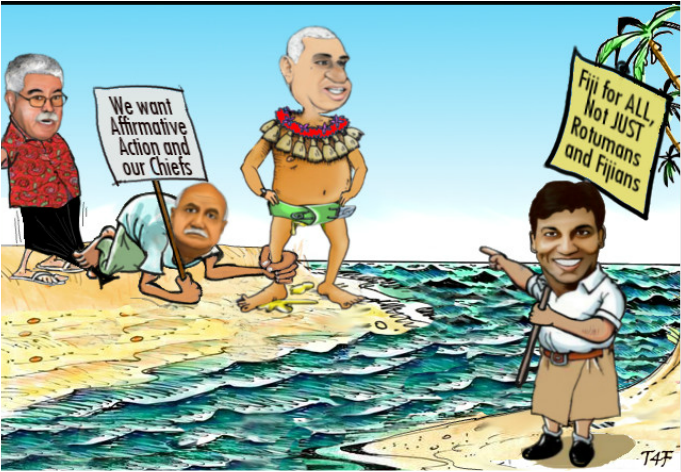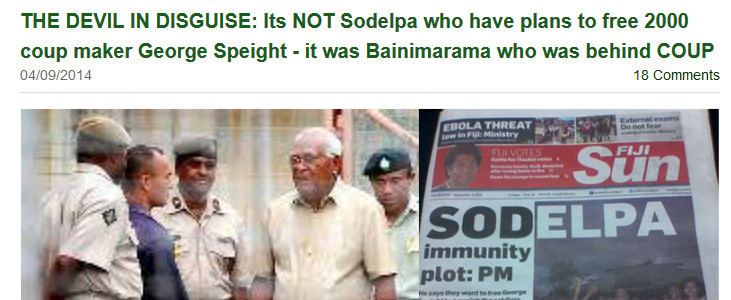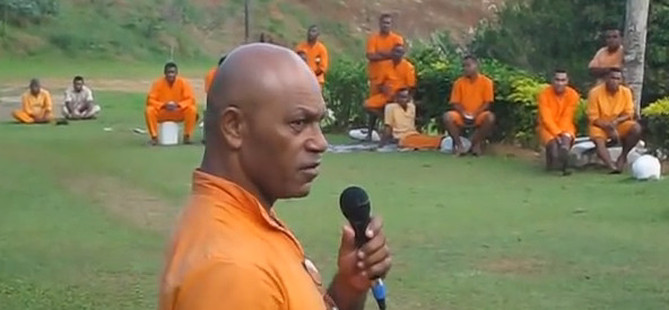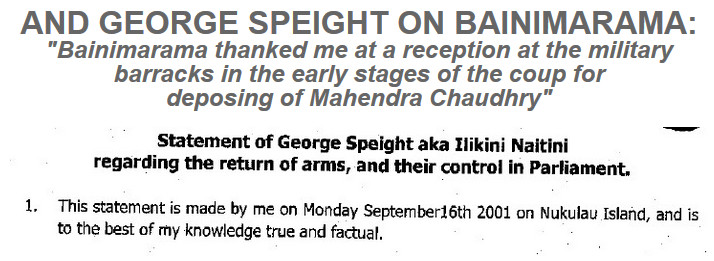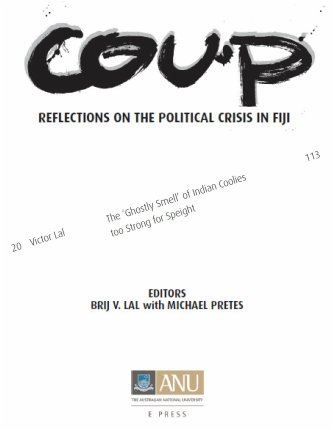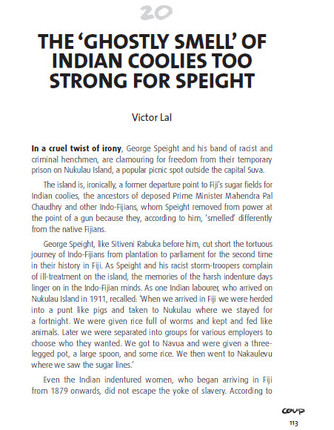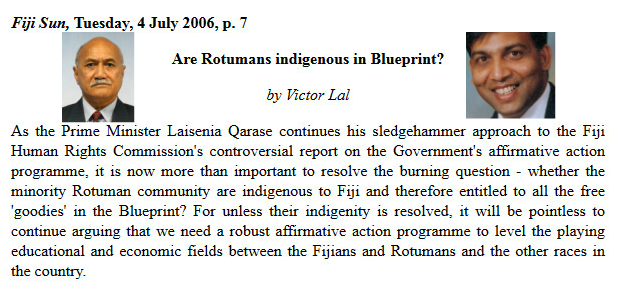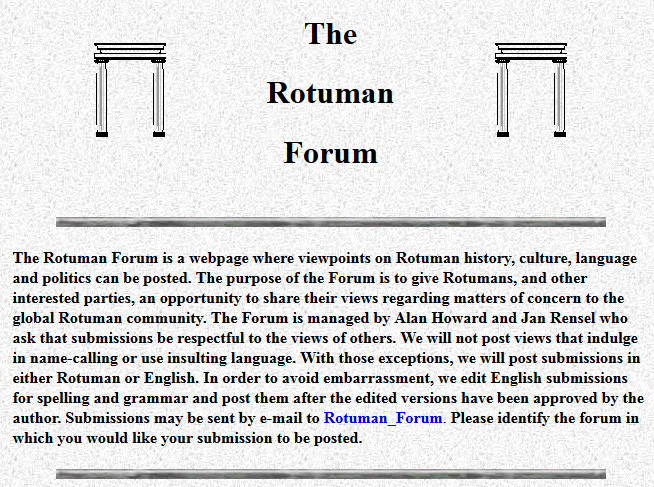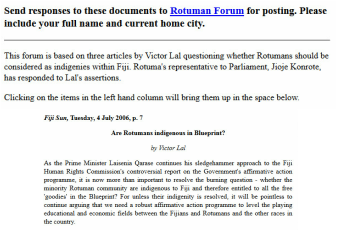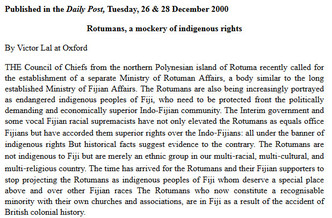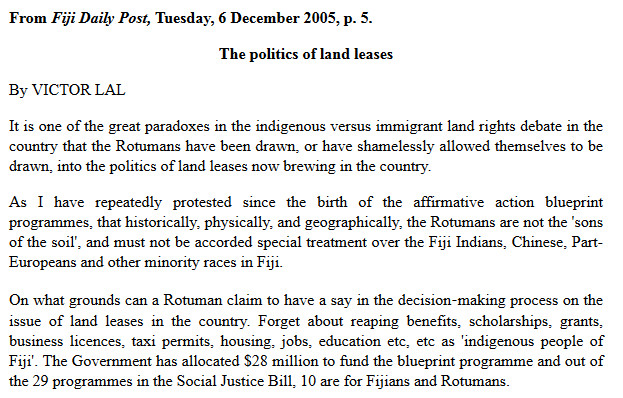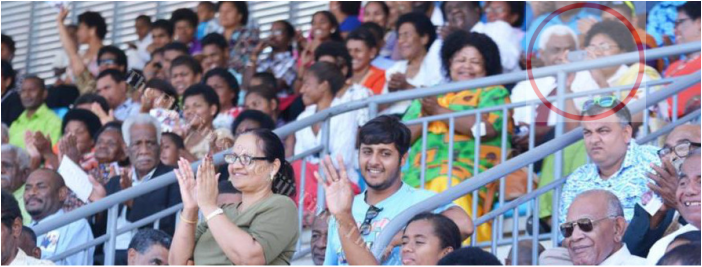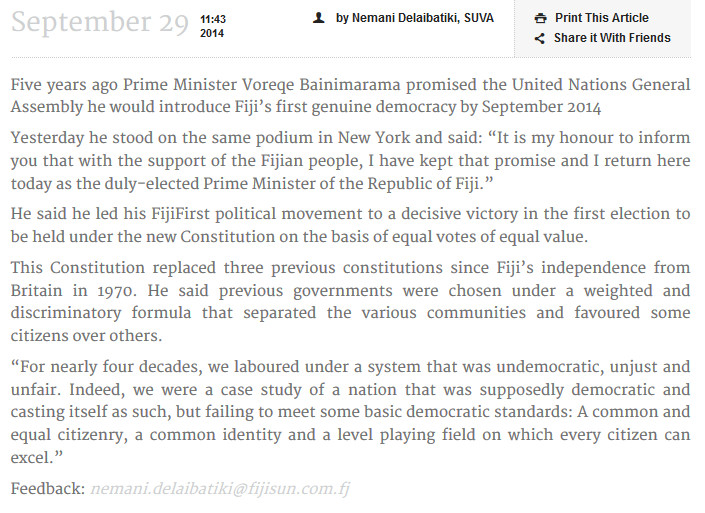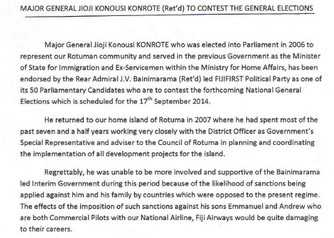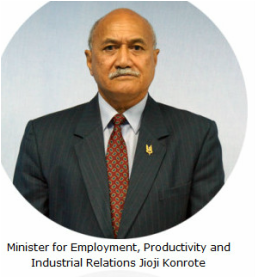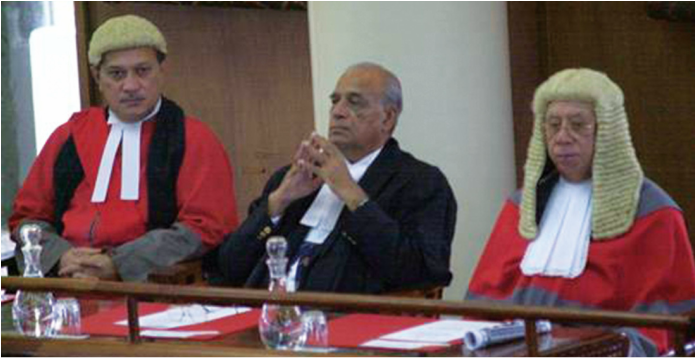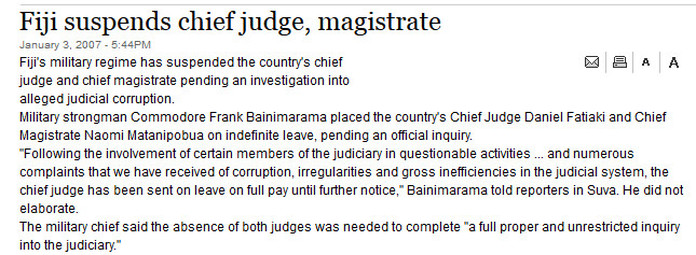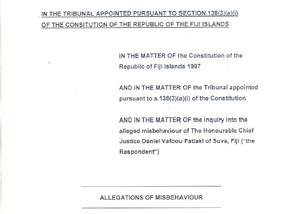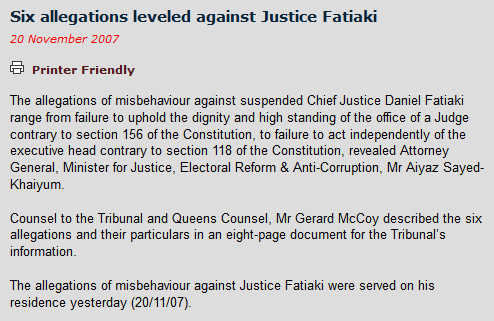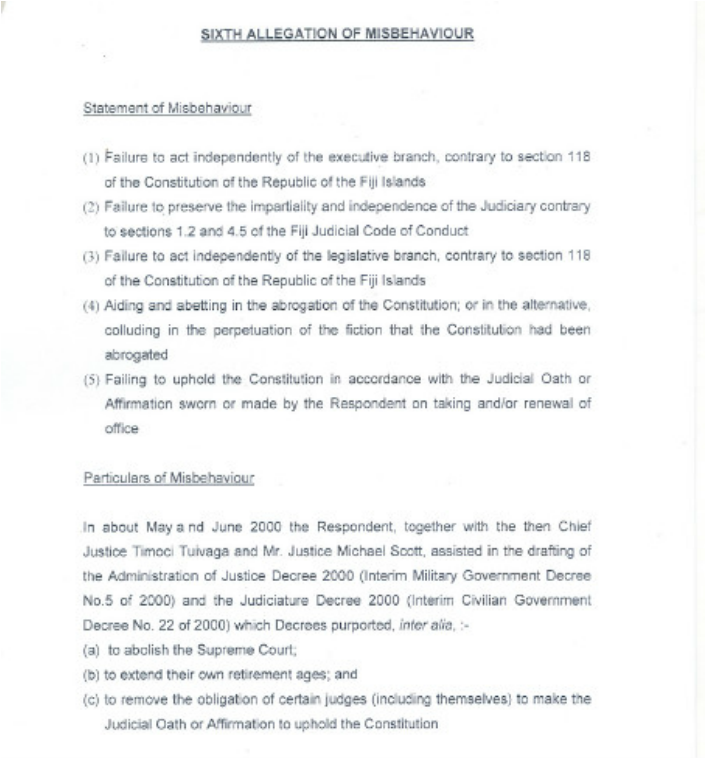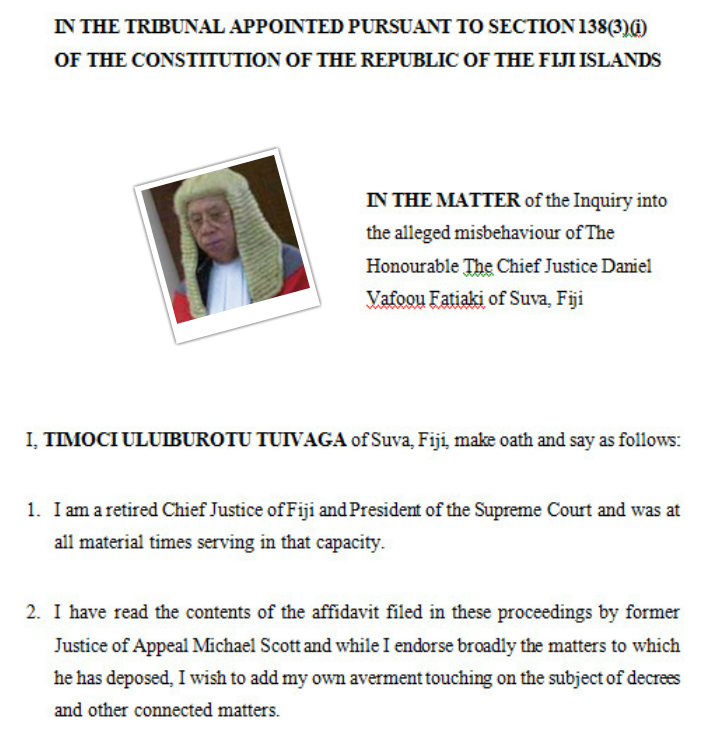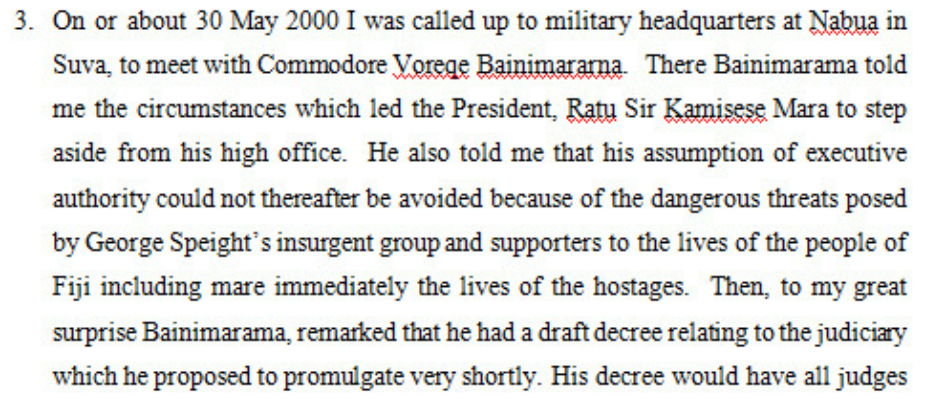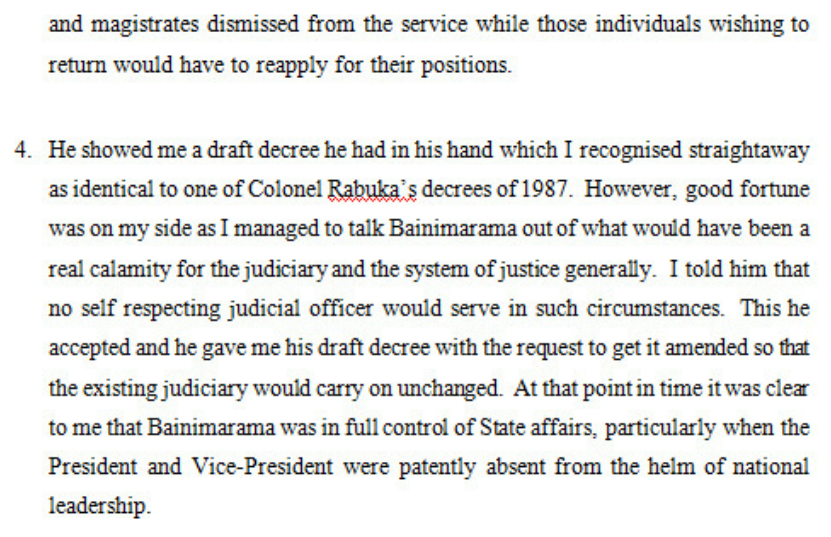LAISENIA QARASE: "The crux of our political crisis in Fiji is that indigenous Fijian and Rotuman communities felt threatened by certain policies which the non-indigenous leadership of the People's Coalition Government had implemented following their decisive victory in our National Elections in May 1999. It was this fear and anxiety about their future as the world's only indigenous Fijian and Rotuman community of just over 420,000 people that led to mass demonstrations and ultimately the Coup d'etat on May 19th this year. It manifested itself also in the mass looting of shops, destruction of property, and threats to people and their families, and unfortunately and tragically, the victims were mainly members of our Indian community. It was in this serious and deteriorating law and order situation that the Fiji Military Forces responded to a request from our Police to take over direct control of law and order and the protection of citizens. To facilitate this role, the Fiji Military Forces abrogated our 1997 Constitution on 29th May. However, as the civilian Interim Administration, we have ourselves taken over from the Army and, as I have said, we are firmly committed to returning Fiji to constitutional parliamentary democracy. We intend to promulgate the new constitution in August next year. General elections will then follow within twelve months."
Address to the Fifty-Fifth Session of the UN General Assembly by Qarase, Bainimarama's then Interim PM, 16 September 2000
FRANK BAINIMARAMA: "I had abrogated the 1997 Constitution because I was satisfied that people engaged in the events of May 19 [2000 George Speight coup] were of the perception that the document had watered down the interests of indigenous Fijians. Whether or not those perceptions accorded with reality was not my principal consideration. The perceptions were genuinely held by largely unsophisticated Fijians not equipped to adequately comprehend the niceties and technicalities of the Constitution.” -
The then RFMF Commander Frank Bainimarama in his affidavit before the
Fiji Court of Appeal, February 2001
JIOJI KONROTE: 'After more than 42 years of loyal and dedicated service...I can justifiably claim that I have done my duty and served the vanua, matanitu kei na lotu well. In this regard, I would like to ask Mr Lal as to what service has he done to this country...?' The Sunday Times (Fiji) 6 August 2006
VICTOR LAL: 'What prompted me to open the debate on Rotumans and their claims to indigenity in Fiji?...It was the speech of Laisenia Qarase, as Interim Prime Minister to the UN General Assembly in 2000, where he had once again justified the violence and bloodshed of the 2000 coup in the name of Fijian and Rotuman indigenous rights. It was in response to that statement that I set out in 2000 to challenge the Rotumans right to burn, loot, assault, and rob the Indo-Fijians of their economic, social, political and religious rights on the mainland of Fiji. I felt the Rotumans, like the Fijians, had no right to join in the orgy of destruction in the name of indigenous rights. What is my individual legacy to Fiji? I stood up for human rights, freedom, justice and democracy in Fiji. This I consider to be my greatest achievement and contribution to Fiji and Rotuma.' The Fiji Times, 20 August 2006
JIOJI KONROTE attacks VICTOR LAL, 6 August 2006, The Sunday Times (Fiji) :
THIS article serves to formally acknowledge, but more importantly refute the views expressed in Victor Lal's latest article titled, Are Rotumans indigenous in blueprint?" which featured in July 2006. It is the fourth such article written since 2000 by the same person who is obviously determined to discredit, embarrass and blatantly insult the chiefs and people of Rotuma. Despite his claim to the contrary that "this is not a personal attack on the Rotuman community, many of whose members are very good personal friends of mine, and some are even related by marriage to my family", I consider his very misleading and vindictive views to be that of a racist as they have been consistently offensive and insulting. In fact, he has the gall and audacity to challenge the authenticity of our indigenity and this is most unacceptable as it questions the integrity of our heritage and indigenity as islanders of Rotuma which is part of the Republic of the Fiji Islands. As Rotumans we are conscious of our unique Polynesian heritage and are equally proud of our special traditional ties with our indigenous Fijian brethren and other Pacific Islanders which date back through the ages when our forefathers settled the islands during their early...After more than 42 years of loyal and dedicated service as a military officer, (Deputy Commander/Chief of Staff, Republic of the Fiji Military Forces), United Nations Assistant Secretary General/Force Commander, United Nations Interim Force in Lebanon (UNIFIL), Permanent Secretary for the Ministry of Home Affairs and Immigration and more recently as Fiji's High Commissioner to Australia and Singapore, I believe that I can justifiably claim that I have done my duty and served the vanua, matanitu kei na lotu well. In this regard, I would like to ask Mr Lal as to what service has he done to this country to qualify him to be so scathing and vexatious in consistently questioning and challenging our status as respectful, law-abiding, hardworking good citizens of across the Pacific.The author is the Minister of State for Immigration & Ex-Servicemen. He is also the Member of Parliament for Rotuma.
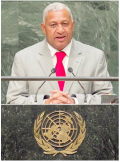
"It has been a long and sometimes traumatic journey for our nation in the 44 years since Independence; 4 coups, a rebellion, four Constitutions and 56 days of shame in 2000 when members of our Parliament were held hostage. Fiji has struggled to be unified and cohesive, our development retarded by our inability to think and work as one nation, one people. But with this election, we have put that era firmly behind us."
Frank Bainimarama to UN General Assembly, 29 September 2014
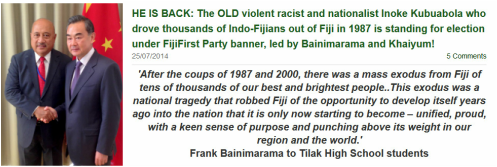
GEORGE KONROTE
Sunday Times (Fiji), August 06, 2006
THIS article serves to formally acknowledge, but more importantly refute the views expressed in Victor Lal's latest article titled, Are Rotumans indigenous in blueprint?" which featured in July 2006. It is the fourth such article written since 2000 by the same person who is obviously determined to discredit, embarrass and blatantly insult the chiefs and people of Rotuma.
Despite his claim to the contrary that "this is not a personal attack on the Rotuman community, many of whose members are very good personal friends of mine, and some are even related by marriage to my family", I consider his very misleading and vindictive views to be that of a racist as they have been consistently offensive and insulting. In fact, he has the gall and audacity to challenge the authenticity of our indigenity and this is most unacceptable as it questions the integrity of our heritage and indigenity as islanders of Rotuma which is part of the Republic of the Fiji Islands. As Rotumans we are conscious of our unique Polynesian heritage and are equally proud of our special traditional ties with our indigenous Fijian brethren and other Pacific Islanders which date back through the ages when our forefathers settled the islands during their early migratory voyage across the Pacific.
No accident of history
In an earlier article, Mr Lal claims that, "The Rotumans, who now constitute a recognisable minority with their own churches and associations, are in Fiji as a result of an accident of British colonial history." What utter nonsense and distortion of the truth. The following are official archival excerpts of the events leading to the formal proclamation when the island of Rotuma and its indigenous people became part of the colony of Fiji. Following the last battle of Saukama in 1878, the chiefs, in their wisdom but more importantly fear of further conflict amongst the different districts and clans, came to the collective decision that their "only chance of escaping from future calamities was to be found in absorption into the colony of Fiji".
Consequently, the first attempt by the chiefs in this regard was made on June 18, 1879 when a letter was sent to Sir George William Des Voeux, who was Acting High Commissioner in the absence of Sir Arthur Gordon, suggesting that, "for the promotion and acceptance of Christianity, but more importantly for the Rotumans to live together in peace and harmony, Rotuma and Fiji should be under one government". Leutenant Graham Bower, Commanding Officer of HMS Conflict, was dispatched to Rotuma to consult further with the chiefs and on July 14, 1879 confirmed our forefathers' desire to petition for cession when the chiefs collectively signed a document which read: "We the chiefs of the Island of Rotuma have heard and understood the letter of the Governor of Fiji. We have also heard the words of the Officer of the Great Queen of England, and we ask the Great Queen to rule our island, and to receive us as subjects. We ask for a magistrate, and we promise to obey him and to keep the peace with one another."
This pledge by the chiefs and the people was further reinforced by High Commissioner Sir Arthur Gordon's visit to Rotuma in December 12-16, 1879 when his dispatch to the Colonial Office in Whitehall, London read: "At all these meetings the most eager desire was expressed for a favourable answer to the petition addressed to Her Majesty by the chiefs and the people, and I have no doubt of the sincerity and unanimity of their desire to be incorporated in the Colony of Fiji. Their motives are indeed very obvious and natural, and I believe them to be quite right in supposing the step to be the only one which will assure them domestic peace, and freedom from vexatious interference on the part of strangers."
A response to the chiefs' petition of cession was finally received on September 17, 1880 from High Commissioner Gordon which confirmed, "the Queen's gracious acceptance of their cession of the island to Her Majesty." The official dispatch read: "The Queen has listened graciously to your petition, and accepts you as her subjects. I rejoice that your wish is thus accomplished. I trust that peace and prosperity may ever endure among you in consequence." This acceptance by Queen Victoria led to the issue of an official proclamation by High Commissioner Gordon on November 5, 1880 confirming the formal incorporation of Rotuma as part of the Colony of Fiji.
Issue of sovereignty
Mr Lal claims that, "Rotuma's sovereignty is not an issue" when referring to the Constitutional Talks in London prior to Fiji's independence in 1970. This is most insulting and disrespectful to Rotumans as it questions the validity, but more importantly, the legality of our very existence and status as a minority indigenous group in Fiji. The participants of the Constitutional Talks in London prior to Fiji's attainment of Independence in 1970 failed in their deliberations to consider Rotuma's sovereignty and special status as an indigenous minority entity as enshrined in the island's Deed of Cession.
In fact, it is my humble opinion that the Talks should have focussed on Sovereignty and all matters pertaining to safeguarding indigenous concerns and interests. I strongly believe that we deserve better than being allocated one Senate seat in the post-independence parliamentary/Legislative government set-up.
How wrong, insensitive, but more importantly ignorant and insulting can he be?
It is all about sovereignty, for our standing and status as members of the indigenous community in connection with the Government's Blueprint for Affirmative Action is purely based on our indigenity to our home island of Rotuma, to the proclamation of November 5, 1880 which confirmed and sealed the official formalisation of our absorption as part of this nation. And lastly, it is about our sovereign rights which were enshrined under the terms of our Deed of Cession of May 13, 1881.
The preamble of our Constitution clearly reflects and legalises the wishes of our chiefs and forefathers that we should share a common destiny with our Fijian brethren as indigenous people and one nation. Following Queen Victoria's endorsement of our chiefs' request, and the traditional chiefly assent and acceptance of the paramount chiefs of Fiji, Rotuma became part of the Colony of Fiji as confirmed by the Proclamation Order of November 5, 1880. This was soon followed by the Proclamation of the Deed of Cession which was signed by our chiefs and Sir Des Voux (who succeeded Sir Arthur Gordon) as Western Pacific High Commissioner and Governor of the Colony of Fiji during a brief, but solemn ceremony on the isthmus of Motusa, Rotuma on May 13, 1881.
The official terms of the Deed of Cession read: "We the chiefs of Rotuma, with the knowledge and assent of our respective tribes, and in accordance with their desire, do, on our own behalf and that of our respective tribes, hereby cede and surrender absolutely, unreservedly and unconditionally to Her Majesty the Queen of Great Britain and Ireland, Empress of India, the possession of and full sovereignty of all ports, harbours, roadsteads, streams and waters, and all foreshores and all islands and reefs adjacent thereto: praying that Her Majesty will be pleased to extend to us such laws as now govern her native subjects in the Colony of Fiji, or such other laws as in Her Majesty's wisdom she may see fit to make and appoint for our Government and for the maintenance of peace and good order."
No free-riding
Mr Lal continues with his virulent rhetoric by suggesting that, "It is to be sincerely hoped that migrant Rotumans or those born in Fiji, whether lawyers or layman, will not hide behind the sulu of Fijian nationalism to trample upon the rights and aspirations of the Indian community to benefit themselves and their kinsmen on the island of Rotuma." As Rotumans we acknowledge with humble gratitude that we are merely equal citizens of Fiji who do not plan "to freely ride on the economic back of Indo-Fijian toil ...".
Nor do we intend to "forcibly gorge into the wealth of the nation and expect the Indo-Fijians to wait for the crumbs from their master's table, the supposedly indigenous Rotumans of Fiji", as rudely inferred by Mr Lal in one of his articles. Since the cession, generations of our people had excelled and continue to excel in all fields of work wherever they are whether in the public service, private sector, the military and disciplined services or the church.
Over the years our small indigenous community worked very hard together with the rest of the different communities of Fiji in serving and building this nation to what it is today. Although our individual and collective contributions to nation-building throughout the years could be assessed as modest and small, it is also my opinion that overall, it has been quite substantial. We have been "punching well above our weight", but do not wish to claim any credit for our contribution to society nor do we expect any special favours from any quarters.
Viti kei Rotuma
As Rotumans we are very mindful and value with great pride our special traditional relationship and connection with Fijians which originated from the days of the early migration and settlement of the islands by our forefathers. Our loyalty and commitment to this country is steadfast, resolute and unquestionable. In peace and war, we stood firm and endured with our Fijian brethren as an indigenous community and entity. We continue to be mindful and cherish with great humility and pride the favourite catchcry of Viti kei Rotuma of our chiefs and elders, in our interaction with other members of the community in all matters pertaining to the matanitu, vanua kei na lotu.
Native land
Mr Lal further asserts that, "Rotumans have no right to entangle in the ALTA-NLTA controversy". We have no intention of interfering or being dragged into the ALTA-NLTA land lease debate nor do we wish "to poke our noses into why and for how long an Indian farmer should be allowed to remain on native Fijian land on the mainland," as Mr Lal asserts. This debate and the final resolution of the issue is best left to the Fijian landowners, the appropriate authorities and other interested stakeholders. As "sons of the soil" of our home island Rotuma, we are primarily concerned and interested in ensuring that our separate Rotuma Land Act is administered and amended in the best interest of our small community.
Serving Fiji well
Mr Lal also claims that, "Rotumans have contributed no more than any other non-ethnic Fijian group in the country".
We do not dispute this.
However, we contend that our contribution to national progress should not be measured against our economic or political clout but rather on sovereignty, indigenity, our loyalty, commitment and service to our nation. The President, Ratu Josefa Iloilovatu Uluivuda, whilst concluding his address at the opening of of the Parliament on June 6, 2006 reminded us about the call to service. He said, "Honourable Members and Senators, I call on all of you to make service to the country the guiding principle of your work. Our people look to you as leaders to guide our nation towards greater harmony and prosperity. You now have the opportunity to take Fiji to a destiny when future generations will say: They Served Their Country Well." Generations of Rotumans have served and will continue to serve our beloved country well.
After more than 42 years of loyal and dedicated service as a military officer, (Deputy Commander/Chief of Staff, Republic of the Fiji Military Forces), United Nations Assistant Secretary General/Force Commander, United Nations Interim Force in Lebanon (UNIFIL), Permanent Secretary for the Ministry of Home Affairs and Immigration and more recently as Fiji's High Commissioner to Australia and Singapore, I believe that I can justifiably claim that I have done my duty and served the vanua, matanitu kei na lotu well.
In this regard, I would like to ask Mr Lal as to what service has he done to this country to qualify him to be so scathing and vexatious in consistently questioning and challenging our status as respectful, law-abiding, hardworking good citizens of this country? Does he consider his claim to be a political analyst who read law in Oxford a qualifying criteria to be so bitter and vengenful in voicing his anti-Rotuman rhetoric publicly? We are not impressed nor are we amused.
Mr Lal's suggestion that, "Rotumans should honourably ask the Government to change the Preamble to the 1997 Constitution" is indicative of an arrogant and insensitive individual who is obviously oblivious to the socio-political realities and local dynamics of our evolution into nationhood over these past years. I consider it the ultimate insult to the Fijian and Rotuman people.
As Rotuma's newly elected Parliamentary representative I believe it is incumbent upon me to denounce Mr Lal's baseless and uncalled for vitriolic and vindictive attacks against my chiefs and people and correct his racist views and knowledge of our special relationship of Viti kei Rotuma. During my swearing-in by the President as a Minister of State and Parliamentarian, I was very mindful of the terms of the Oath of Allegiance that I am required to serve our beloved Fiji and our small Rotuman electorate well.
As a former soldier, I consider my long and continued service to Fiji as an obligation which I will have to fullfil to the best of my ability. A new multi-party Cabinet has now been formed and I believe that all good citizens of Fiji will want to see it work, therefore we should be more tolerant, accommodating and forgiving for true reconciliation to be achieved and peace and harmony to reign.
As a Christian, I will ask my chiefs and people to forgive Victor Lal for the great injustice he has done against us and hope that he is more sensitive, fair and considerate in future as such controversial and divisive public utterances are not conducive to reconciliation, peaceful and harmonious co-existence within this diverse multi-ethnic nation of ours.
May Almighty God continue to richly bless this beloved country of ours Fiji.
The author is the Minister of State for Immigration & Ex-Servicemen. He is also the Member of Parliament for Rotuma.
When racism and indigenous rights come into play
THE Minister of State for Immigration and Ex-Servicemen, George Konrote, while refuting the views expressed by me has raised a number of issues and has called me a racist, insensitive, and an ignorant individual.
He has also challenged me to match his 42 years of contribution to the service of the country. I am, therefore, obliged to rise to the challenge and to reply to his article titled 'The birth of Viti kei Rotuma' (ST 6/8). Mr Konrote says that since 2000, I have been determined to discredit, embarrass, and blatantly insult the chiefs and people of Rotuma. He also says that some of my views are that of a racist as they have been consistently offensive and insulting.
His own reply, especially the historical background, has been largely extracted from his Rotuma Day 2005 address which he delivered as Fiji's High Commissioner to Australia. In that address, celebrating the 124th anniversary of the cession of Rotuma to Great Britain, Mr Konrote had taken a swipe at me without deliberately identifying me by name.
I do not think I am racist, arrogant, insensitive, nor have I insulted the Rotuman chiefs. What I merely stated in those articles was that the Rotumans and their chiefs, whose islands had been joined to Fiji for administrative purposes, should have distanced themselves from the naked racism that was being practised by some misguided Fijian racists, and also perpetuated in the Constitution. What I challenged, and which I am still challenging, is that there is no grain of truth or evidence that Rotumans are indigenous to Fiji, and therefore they must have a pride of place in the Constitution, and be entitled to all the goodies in the Affirmative Action programs. What is racist about such a contention? Will the Rotumans be also included in the contentious Qoliqoli Bills?
Was Governor Sir Harry Luke also a racist and insensitive British representative when he wrote in his diary on July 21, 1939: "Arrived at Rotuma, an island of fourteen square miles, hilly and picturesque, which politically is a dependency of Fiji although it is over 400 miles by sea route from Suva. The Rotumans, who number about 4000 including a colony of them in Suva, have no connexion whatever with the Fijians by blood or language. They are of Polynesian stock with an admixture of other strains ranging from Mongoloid to European, the latter derived from escaped convicts from New South Wales." Even acting Governor Sir George William Des Voeux, to whom the first attempt was made in 1879 to annex Rotuma, noted in his autobiography that the Rotumans "though much resembling in appearance others of the light-coloured Polynesian races, seem to be nevertheless of different origin".
Mr Konrote has produced a long historical tract on Rotuma's Deed of Cession and asserts that the Rotumans were given a raw deal at the talks in London leading to Fiji's independence in 1970. As I have recently pointed out, if the Rotumans got a raw deal, it was from Fijian chiefs, who felt that all that the Rotumans deserved was one seat in the Senate. The late Dr Lindsay Verrier had even suggested in London that Rotuma should be merely federated with Fiji after independence.
I have no quarrel with Mr Konrote's historical narrative, for it was precisely on that basis that I had argued that Rotumans are not indigenous to Fiji and are therefore not entitled to stand in the front queue ahead of non-Fijians. He condemns me on the issue of sovereignty, calling me wrong, insensitive and an ignorant individual. I have never questioned Rotuma's sovereignty. What I noted in the previous articles, instead, was that Rotumans have some legitimate grievances, especially bureaucratic red tape with the Fiji Government and the erratic nature of shipping, and therefore see independence as a way of assuming more direct control of their destiny. Many are apprehensive about being dominated by Fiji.
I also noted that their desire for two seats, one for Rotuma, and one for Rotumans in Fiji, should be considered as a necessary corrective for the injustice in London. I also noted in a 2000 article that "Rotumans have done very well in Fiji, disproportionately attaining positions at the upper ends of the occupational ladder. They have made solid contributions to Fiji as a whole through their work in government and business".
What is racist about such statements?
And yet Mr Konrote brands me a racist, while pointing out that the Rotumans have been "punching well above our weight" in Fiji. Well, here one can make two points. If the Rotumans are doing so well, despite their minority numbers, than why should they be considered as in great need of the affirmative action goodies in the blueprint? Second, Indo-Fijians could equally reply that the reason the Rotumans are "punching well above their weight" is because some of the best and brightest Indo-Fijians have been shut out of those top jobs and rewards on the grounds that they are not "indigenous" to the country. Meanwhile, I would point out to him that Des Voeux, in his autobiography published in 1903, discloses that he had disagreed with Governor Sir Arthur Gordon on the question of annexation to Fiji.
He disagreed with Gordon that Rotuma, "a solitary island, distant some 200 miles from the nearest portion of Fiji, and inhabited by a people totally distinct from the Fijians in race, language, and social organisation, was naturally a part of Fiji". Des Voeux also disagreed with Gordon that Rotuma's annexation would be in any way an advantage to Fiji. Mr Konrote asserts that "The preamble of our (Fiji) Constitution clearly reflects and legalises the wishes of our chiefs and forefathers that we should share a common destiny with our Fijian brethren as indigenous people and one nation".
Well, in 1970, the Indo-Fijian leaders at the Constitutional talks in London categorically rejected any claim to either British or Indian citizenship. An overwhelming 98 per cent of Indo-Fijians (except a handful of Gujarati merchants) accepted Fiji citizenship, cutting any legal links with India. They wanted to share a common destiny with all the citizens of Fiji. If one were to accept Mr Konrote's contention that since his chiefs had renounced any claim to Rotuman separateness and should, therefore, be considered indigenous to Fiji, than in a similar breath he and his Fijian counterparts should also accept Indo-Fijians as natives of Fiji, for they had also accepted to be governed by the new leaders of Fiji, and still do.
Mr Konrote has challenged me to state what service I have done to the country. Well, I will tell him. He should go to his political boss, the Prime Minister, Laisenia Qarase, and ask him what I did to save Fiji in 2000 from George Speight, a copycat coup treasonist in the footsteps of Mr Konrote's former military boss Sitiveni Rabuka. What else did I do? I wrote a book showing how he, as Rabuka's second in command after the 1987 coups, helped to destroy democracy and freedom in the country.
What else?
Oh, yes, I persuaded a group of his 1987 Indo-Fijian victims now living in Australia not to file a civil suit on his arrival as a diplomat to that country, based on the Pinochet precedent, when the Chilean military dictator was arrested and charged in London with human rights violations in his country. In any case, he is well aware that he was promoted to a colonel during the illegal seizure of power in 1987. He is equally aware that as Rabuka's official biographer claims, that in the 1990s the late President Ratu Sir Penaia Ganilau had rejected Rabuka's recommendation that Mr Konrote should replace him (Rabuka) as army commander. The military leadership went to Ratu Epeli Ganilau, later the chairman of the Great Council of Chiefs.
Finally, I also notice that Mr Konrote writes that, "As a Christian, I will ask my chiefs and people to forgive Victor Lal for the great injustice he has done against us and hope that he is more sensitive, fair and considerate in future". As to Rotuman chiefs, all I noted was the observations of Howard and Rensel, who observed that there was lack of communication between the Rotuma Council and the people they serve, about the council's ineffectiveness in formulating and carrying out development policies, and about the alleged self-serving behaviour of the council.
I have done no injustice to the Rotuman community, and therefore, do not expect any forgiveness. If anything, I have praised them and highlighted some of their genuine grievances. I have only spoken out against the injustice that is being done to non-Fijians and non-Rotumans over the affirmative action programs.
HISTORICAL TIME LINE, KONROTE, SEPTEMBER 2014:
ROTUMA'S PRODIGAL SON DANIEL FATIAKI: How FijiFirst Party leader Bainimarama and party general-secretary Aiyaz Khaiyum falsely accused, humiliated, and hounded Fatiaki off the Judicial Bench as
Chief Justice, and out of Fiji:
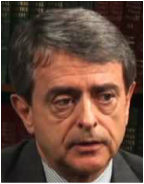 Dinger
Dinger President Suspends Chief Justice Fatiaki:
President Iloilo suspended CJ Fatiaki 1/19 and issued a directive to investigate allegations that Fatiaki drafted decrees and provided legal advice in relation to 2000 coup. The Interim Attorney General said a Tribunal would be set up inquire into the allegations. CJ Fatiaki was placed on forced leave by the interim government earlier this month. Anthony Gates was named "Acting Chief Justice" January 16. (Comment: The ironies of the interim government investigating a judge for his alleged role in helping provide legal justification for the removal of an elected government, in Fatiaki's case allegedly the Chaudhry government, are staggering.)
CJ Fatiaki Speaks:
In an interview in the January 22 Fiji Times, Chief Justice Fatiaki vehemently denied rendering any legal assistance to the interim military regime that was set up after the 2000 coup. The interim-government announcements concerning Fatiaki's suspension as CJ have referred to issues dating back to 2000. Justices Gates and Shameem, who apparently orchestrated Fatiaki's recent suspension, with Gates then becoming Acting CJ, have long alleged in private conversations that Fatiaki demeaned the independence of the judiciary by providing legal advice to Bainimarama and then-President Mara about how to remove PM Chaudhry at a time when Chaudhry was being held incommunicado by the Speight coup participants. In a conversation with the Ambassador last weekend, Fatiaki repeated his flat denial of ever providing such advice to Bainimarama, though he seemingly acknowledged providing advice to President Mara when asked. Fatiaki observed: "What I did then pales in comparison" to the assistance Nazhat Shameem and Anthony Gates have given Bainimarama this time around. Fatiaki described the current situation as "surreal." He expressed frustration at being banned by the PM's office from traveling to conferences abroad. Dinger!
Fijileaks Editor: But read the former Chief Justice Sir Timoci Tuivaqa's unpublished affidavit that denies Fatiaki helped draft the Justice Decree 2000; also Tuivaqa reveals Bainimarama's own role during the 2000 Speight coup crisis:
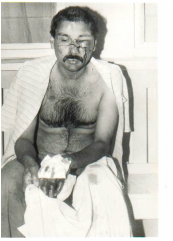
The car was then driven to Colo-i-Suva where Singh was blindfolded by putting pads on both eyes before a strip of cloth was tied around his head in a blind-fold and a balaclava pulled securely over his head and tied around his neck. Singh was then walked into the woodland where his hands were tied behind him after which he was made to sit down and another rope then tied around his feet and slung around his neck. He said one of the soldiers sat behind him holding a noose around his head and keeping him pulled backwards.
Singh was told not to make any sound or try to escape. Afterwards he was repeatedly punched and kicked violently in the head, face and body and interrogated whilst he remained defencelessly bound. His captivity lasted some 11 hours.
Towards night fall, the five soldiers either jointly or severally put on dark balaclavas and unbound Singh. He was then assaulted violently on the head and face from both sides for a prolonged period lasting some 10 minutes and methodically smashed up both his hands with a metal pipe furnished with a wooden handle. Afterwards, the soldiers cut Singh's hair, burnt it with cigarettes and disappeared into the darkness, taking Singh's shoes with them and leaving him alone in the dark in the forested hill. As a result of this abduction and torture Singh was hospitalised for three weeks at the Colonial War Memorial Hospital in Suva and he suffered the following injuries: (a) Facial bruising around the left eye and orbit with sub-conjunctival haemorrhage;(b) Rope burns around both wrists;(c) Fracture of right radial styloid;(d) Compound fracture of the left fifth finger; (e) Fracture of base of fifth meta-carpal;(f) Abrasions of both hands;(g) Superficial burns of left shoulder and right forearm consistent with cigarette burns;(h) Contusions of anterior chest wall; and (i) Decreased sensation of left hand due to neuropraxia (bruising) of radial nerve from the wrist-rope. The brutal soldiers were led by SOTIA PONJIASI. Bizarrely, instead of putting the torturers on trial, Singh and six others had been charged in the Magistrates' Court of Suva on two counts of (1) having burnt a copy of the Constitution of the Republic of Fiji on 18th October 1990 with seditious intention contrary to section 65(1)(iv) and 66(1)(a) of the Penal Code and (2) having taken part in an unlawful assembly on the same day contrary to section 86 and 87 of the Penal Code. The five soldiers later pleaded guilty and were given suspended prison sentences and Singh was awarded compensation.
http://www.fijileaks.com/home/from-master-bomb-maker-to-face-on-ballot-list-aiyaz-sayed-khaiyums-fight-for-democracy-in-1987-to-brutally-holding-fiji-down-under-frank-bainimaramas-dictatorship
